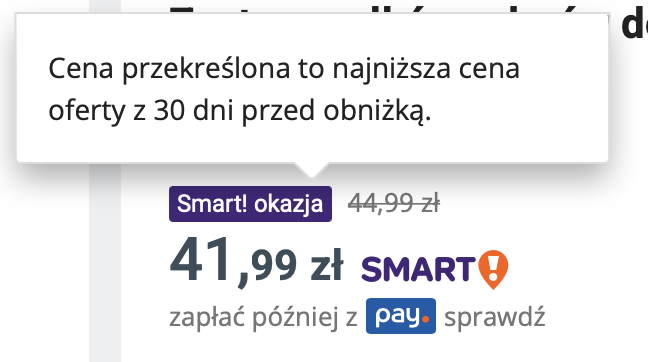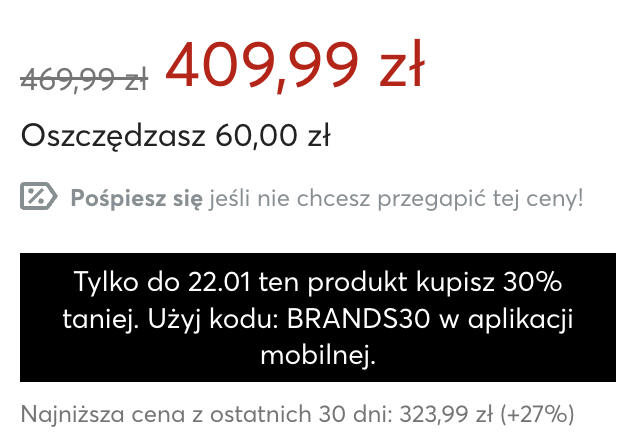Omnibus Directive Poland / Promotional Pricing
- Antitrust / Competition Law
- Unfair competition
- Consumer Protection
- Payment terms (delays)
- Advertising Law
- Franchise Regulation

Price Indication Directive in Poland
On January 1, 2023, the implementation of the Price Indication Directive entered into force in Poland. New regulation of prices indication in promotions and sales introduces significant changes to the provisions of the consumer protection law in Poland and European .
One of the changes will have a significant impact on e-commerce and traditional market behavior is the amendment of Polish the act on information on prices of goods and services. The amendment introduces the obligation to inform the consumer, as part of promotions and sales, about the lowest price of a product or services within 30 days before the introduction of the discount (price reduction).
Lowest price in 30 days – Definition in Poland
New wording of Art. 4 sec. 2 of the Act on information on prices of goods and services (Price Indication Act) states that:
In each case of informing about a reduction in the price of a good or service, next to the information about the reduced price, information about the lowest price of this good or service, which was in force during the period of 30 days before the introduction of the reduction, is also displayed.
Products offered for shorter period
If a given good or service is offered for sale in a period shorter than 30 days, the trader shall inform consumer about the lowest price of this good or service, within the period from the date of commencement of offering until the date of the reduction.
Goods that deteriorate quickly
In the case of goods that deteriorate quickly, the information on the “previous” price shall be displayed next to the information on the reduced price.
Promotional pricing – UOKiK inspection
Polish Consumer Protection Authority at the beginning of January 2023 launched audit campaign and inspected over 50 major market players. Some of the market players were still in process of implementing software solutions, which is expected to trigger penalty procedure for infringement of new regulation regarding informing of the lowest price in 30 days period.
How to display the lowest price in 30 days?
According to Price Indication Act in Poland the information on the reduced price shall be displayed in a generally accessible place and clearly visible to consumers, on the given goods, directly next to the goods or in the vicinity of the goods to which it relates, in particular on a notice, in the price list, in the catalogue, in the form of an overprint or an inscription on the goods or packaging.
Different approaches in price indication (lowest price in 30 days)
Market players have taken different approaches in presenting the lowest price of last 30 days.
| Lowest price indication in the separate section with explanation |  |
| Lowest price – crossed out with explanation in pop up window |  |
| Lowest price indication in the separate section with explanation
and indication of how much the consumer “saves” |
 |
Price Reduction Announcement in Promotions or Sales
An announcement of a price reduction may take various forms, in particular:
- Percentage – e.g. – 10%
- Amount – e.g. you save PLN 20
- Indication of the new price – e.g. currently PLN 49, instead of PLN 55
- Other – any promotional technique, e.g. “today minus the VAT amount”
All forms of advertising will be treated in the same way as announcements about a price reduction.
Percentage reductions
If the price reduction announcement reads “20% off” and the lowest price in the previous 30 days was e.g. 1.000 PLN, the seller will be obliged to quote 1. 000 PLN as the earlier price from which the 20% discount shall be calculated, even if the previous price was higher. This shall prevent sellers from artificial “pumping” of the percent discount amount.
Additional references to price reductions
The regulation does not prevent the seller from providing other reference prices when announcing a price reduction. This may be done on condition tat such additional reference prices are clearly explained, do not mislead and do not distract the consumer from the lowest price from 30 day prior to the promotion.
Price reductions in multiple sales channels
When selling through multiple sales channels at different prices and these are the subject to general notice of price reduction – the seller is under obligation to indicate “the previous price” for each separate channel.
Misleading price reduction announcements that give the impression that the reduction applies to all channels, when in fact only certain channels are covered by the price reduction, are to be assessed as unfair commercial practices (as defined in unfair commercial practices directive).
General price reductions
Price Indication Directive (Omnibus Directive) does not prevent traders from announcing price reductions in general terms, e.g. “30% off today”. If the price reduction is announced in the form of a general statement, such as a TV or online advert, the previous price does not need be displayed on the same announcement. The prior price of individual goods covered by the announcement must, however, be indicated at the point of sale, i.e. on the relevant price tags in stores or in the price sections of online store interfaces.
Exemptions
Loyalty programs and personalized price reductions
As a rule Omnibus Directive does not apply to loyalty schemes for the retailer’s customers, such as discount cards or coupons, which entitle the consumer to a price discount on all of the retailer’s products or on a specific range of products for longer uninterrupted periods (e.g. 6 months or that allow you to accumulate points for future purchases.
Personalized price reductions and discounts
Price Indications Directive also does not apply to actual personalized price reductions that are not an “announcement” of a price reduction, e.g. reductions resulting from previous purchases made by the consumer from a given retailer. Other examples of genuine personalized price reductions that fall outside are discounts granted to a given consumer on special occasions, such as joining a loyalty programme, the consumer’s wedding or birthday, as well as discounts applied at the time of purchase that have not been “announced” in advance.
Nonetheless it is important to note that the Price Indication Directive will apply to those price reductions which, although presented as personalized, are actually offered/announced to the general public.
Penalties – incorrect determination of the lowest price in 30 days
First of all, failure to comply with the requirements of the new regulation results in the imposition of a financial penalty by the Office of Competition and Consumer Protection of up to 10% of turnover.
In addition, if the entrepreneur fails to perform the obligations, the voivodeship inspector of the Trade Inspection imposes a fine of up to PLN 20,000.
However, if the entrepreneur has failed to perform the obligations at least three times within a period of 12 months, counting from the date on which the violation of these obligations was found for the first time, the voivodeship inspector of the Trade Inspection imposes financial penalty (fine) of up to PLN 40,000.
FAQ
When Omnibus Directive was implemented in Poland?
Omnibus Directive was implemented and is binding in Poland since 1.01.2023.
How to display the 30 days lowest price in Poland?
The information on the reduced price shall be displayed in a generally accessible place and clearly visible to consumers, on the given goods, directly next to the goods or in the vicinity of the goods to which it relates, in particular on a notice, in the price list, in the catalogue, in the form of an overprint or an inscription on the goods or packaging
What is the penalty for not displaying or improper displaying 30 days lowest price in Poland?
The penalty can reach 10% of annual turnover of the entity that breached the rule.
Remaining regulations of Omnibus Directive / Poland
Omnibus Directive (Consumer Rights Directive) amended number national provisions / consumer protection regulations in Poland, incl.:
- Consumer Protection Rights Act of Poland,
- Counteracting Unfair Market Practices Act,
- Information on Prices of Goods and Services Act, and
- the Civil Code of Poland.
Adaptation to new rules of consumer protection
New rule of Polish law did not provide much time for entrepreneurs for adaptation as the Polish implementation act was just passed in December 2022. However, market players, e-commerce providers, online marketplace providers were already preparing for the change since 2019, as this new regulation of European Union widely discussed.
Polish Competition Authority (UOKiK) did not give any grace period to the market as the first inspection campaign of over 40 entities started only after 2 weeks from entry into force of the new provisions. It is expected that some of the market players will face UOKiK charges for improper or late adaptation of their procedures and platforms.
Implementation of new European Union consumer protection rules
New EU consumer protection rules (Omnibus Directive) are now implemented to Polish law and they mainly relate to (inter alia):
- Price indications during sales
- Warranty claims
- Searching and offers location
- Consumer reviews
- Individual price fixing
- Tickets for events
- Digital content
- Purchase of goods in consideration for personal data
Price information obligations
All traders when running promotion sales are now under obligation to present:
- total price
- unit price, and
- lowest price of the 30 days preceding the discount.
Prior lowest price may be indicated under slightly different rules in case of:
- short usability products – price prior to reduction
- products offered for less than 30 days – lowest price from the start of trade until the introduction of the sale or promotion.
The obligation is not applicable to simple discounts not related to marketing efforts / announcement of sales or promotion.
Warranty claims and complaints
Some important changes are introduced to the complaints procedure. This includes:
- Name change: “warranty” -> “liability for non-conformity”.
- First tier consumer right – in the first place the consumer will be equipped with the right to demand repair or replacement of defective goods
- Second tier consumer right – refund will be available only at the second stage of the complaint procedure.
- Non-conformity presumption will now last 2 years
- In case of second-hand goods – it will be possible to shorten sellers’ liability to one year.
- Consumer claims limitation period will now amount to 6 years.
Double quality
Implementation of the Omnibus Directive in Poland prohibits placing on the market and advertising goods as identical if in the other countries of the EU they are different, e.g. with different composition, unless this is objectively justified.
Placement of goods and services
As per new consumer law rules – platforms with search engines, and in particular – online marketplace stores – are obligated present their offers placement parameters. New obligations aim to make the consumer aware on the placement rules (sellers influence over search results appearance). Every paid placement / spot will need to be clearly indicated.
Consumer Reviews
Platforms offering goods and provide access to reviews are now under obligation:
- to inform consumers whether they verify consumer reviews,
- if yes – how they verify consumer reviews,
- if they have included all the opinions, or
- if review were moderated, modified, removed or hidden.
New rules clearly prohibit to present false or distorted consumer reviews on goods or services.
Individual price adjustments
If the platform adjusts the price (automated decision making with regards to offered prices), e.g. as per location, device, history, cookies etc. it will be under obligation to inform consumer about this fact. The rule will not be applicable to dynamic price profiling or real-time pricing, i.e. mechanisms that are based on factors unrelated to a specific user, such as a change in supply / demand for particular goods.
Tickets for events
New Omnibus regulations introduced a ban to purchase tickets for events via bots and afterwards resell them to consumers.
Digital content and sales of digital services
New regulations introduce a rule under wich sale of digital goods / any digital elements is subject to consumer protection. Traders will also be under legal obligation to provide updates of digital goods for the period of at least 2 years.
Goods for personal data
Consumer protection is now equal for purchase of goods for money, as well as purchase of goods for personal data.
Unsolicited visit and right of withdrawal
Withdrawal from a contact concluded during unsolicited visit will now amount to 30 days.
Purchase of financial products
Purchase of financial products is now forbidden to be performed at show or trip, otherwise null and void.
Payments only after lapse of withdrawal period
It is not forbidden to accept immediate payments for the contracts concluded during unsolicited visit or during a show or a trip. Acceptance of payment is only possible after lapse of withdrawal period.
